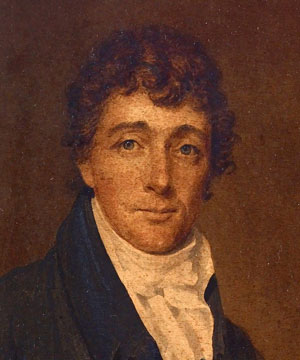14 Sep On This Day in UB History: September 14 (Francis Scott Key)

Francis Scott Key
Francis Scott Key was a United Brethren member. He and a UB preacher named John Snook organized a Sunday school in Keysville, Md. Key donated songbooks and led the singing. They also went on evangelistic tours together, with Key handling the music. Key later became a prominent lawyer in Baltimore and Washington, D.C.
In 1814, during the War of 1812, Key, now 35 years old, boarded the HMS Tonnant to arrange a prisoner exchange; a friend, Dr. William Beanes, was being held aboard the ship. The exchange was successful. However, the British wouldn’t let the Americans leave until they had finished their attack on Fort McHenry in Baltimore, lest Key betray their plans and strength. Fair enough.
Thus, on September 13, 1814, Key had a front row seat to watch the extended bombardment of the American fort. The next day, Key wrote a poem which he titled “Defence of Fort M’Henry.” It was published within a few days in newspapers, and it became a big hit. Key later had the poem set to a popular British tune.
The war ended six months later, and Key returned to his career as a lawyer. A slave-owner until 1820, Key set all of his slaves free and labored fervently against slavery. However, he apparently didn’t remain United Brethren.
“The Star Spangled Banner” became the national anthem by a Congressional resolution in 1931.
Peter Glossbrenner, a second-generation immigrant from Germany, was an artilleryman helping to defend the city of Baltimore. Perhaps he was in Fort McHenry itself–we don’t know. We do know that, somewhere in the city, was Peter’s wife and two-year-old son, Jacob John. Peter died in 1819 after being kicked by a horse. But his son grew up to serve 40 years as a United Brethren bishop–longer than anybody before or since.
Defence of Fort M’Henry
O! say can you see, by the dawn’s early light,
What so proudly we hail’d at the twilight’s last gleaming,
Whose broad stripes and bright stars through the perilous fight,
O’er the ramparts we watch’d, were so gallantly streaming?
And the rockets’ red glare, the bombs bursting in air,
Gave proof through the night that our flag was still there —
O! say, does that star-spangled banner yet wave
O’er the land of the free, and the home of the brave?
On the shore, dimly seen through the mists of the deep,
Where the foe’s haughty host in dread silence reposes,
What is that which the breeze o’er the towering steep,
As it fitfully blows, half conceals, half discloses?
Now it catches the gleam of the morning’s first beam,
In full glory reflected now shines on the stream —
‘Tis the star-spangled banner, O! long may it wave
O’er the land of the free, and the home of the brave.
And where is that band who so vauntingly swore
That the havock of war and the battle’s confusion
A home and a country should leave us no more?
Their blood has wash’d out their foul foot-steps’ pollution,
No refuge could save the hireling and slave,
From the terror of flight or the gloom of the grave;
And the star-spangled banner in triumph doth wave
O’er the land of the free, and the home of the brave.
O! thus be it ever when freemen shall stand
Between their lov’d home, and the war’s desolation,
Blest with vict’ry and peace, may the heav’n-rescued land
Praise the power that hath made and preserv’d us a nation!
Then conquer we must, when our cause it is just,
And this be our motto — “In God is our trust!”
And the star-spangled banner in triumph shall wave
O’er the land of the free, and the home of the brave.

Randy Neuman
Posted at 09:24h, 14 SeptemberI don’t think I would call him a “United Brethren member”. He was good friends with John Snook and helped organize a United Brethren Sunday School and served as song leader. But most sources indicate he was an Episcopalian.